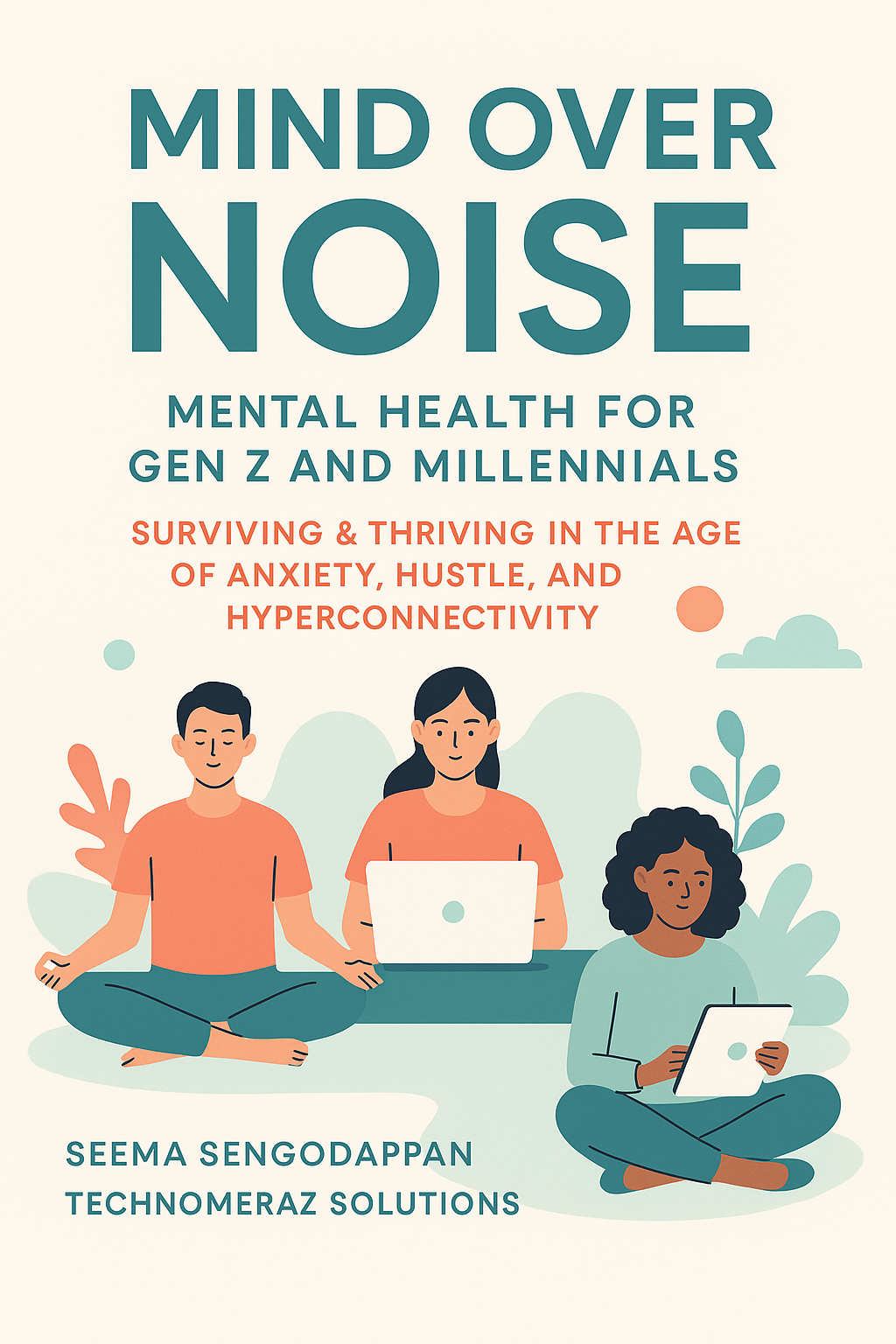
Mental health guidance for Gen Z and Millennials
₹299.00₹199.00
Discover 'Mind Over Noise' – your essential guide to navigating anxiety, stress, and the overwhelming buzz of hyperconnectivity in today's digital age. Tailored especially for younger generations, this insightful book is packed with actionable strategies and expert-backed tips to help you take charge of your mental well-being. Start building healthier habits, find calm amidst chaos, and reclaim your peace of mind, one page at a time. This paperback edition features a sleek, modern cover design and a handy size perfect for your backpack or bedside table. Invest in your self-care journey with this must-have resource.
### Mental Health Guidance for Gen Z and Millennials Mental health is an increasingly crucial conversation in today’s society, especially for Gen Z and Millennials. As you navigate the complexities of life in a fast-paced, digital world, understanding and prioritizing your mental well-being can significantly impact your overall quality of life. Here are some strategies and insights tailored for you. #### 1. **Recognize the Signs of Distress** Understanding when you’re struggling is the first step towards seeking help. Common signs of mental health challenges include: - Persistent sadness or low mood - Excessive worry or anxiety - Changes in sleep patterns or appetite - Withdrawal from social activities - Difficulty concentrating - Feelings of hopelessness or worthlessness If you notice these signs in yourself or friends, it’s essential to address them early. #### 2. **Prioritize Self-Care** Self-care isn’t just a trendy buzzword; it’s a vital component of maintaining mental health. Prioritize time for activities that nurture your mind and body. Here are some self-care practices: - **Exercise:** Regular physical activity can improve mood and reduce feelings of anxiety and depression. - **Mindfulness and Meditation:** Techniques such as deep breathing or guided meditation can help ground you and alleviate stress. - **Healthy Eating:** A balanced diet can impact your mood and energy levels; consider integrating more fruits, vegetables, and whole grains into your meals. - **Sleep Hygiene:** Aim for 7-9 hours of sleep a night. Establish a consistent sleep schedule and create a calming nighttime routine to improve your sleep quality. #### 3. **Build a Support Network** Maintaining healthy relationships is essential for your mental health. Surround yourself with supportive friends and family who listen and understand. Don’t hesitate to share your experiences and feelings with them; vulnerability can strengthen bonds and lead to deeper connections. Also, consider joining groups or communities that share your interests, which can provide a sense of belonging. #### 4. **Leverage Technology Wisely** For Gen Z and Millennials, technology is a double-edged sword. On one hand, it offers social connection and access to mental health resources; on the other, it can contribute to feelings of isolation or inadequacy. Here are some tips for using technology to support your mental health: - **Limit Social Media Usage:** Consider setting boundaries around your social media use, as excessive scrolling can lead to comparisons that negatively impact your self-esteem. - **Follow Positive Influencers:** Curate your feed by following accounts that promote mental health awareness, positivity, and self-acceptance. - **Explore Mental Health Apps:** There are several apps designed to help manage stress, provide guided meditation, track moods, and connect you with therapists. #### 5. **Seek Professional Help When Needed** There’s no shame in seeking professional support. Therapy can be a valuable resource for anyone facing mental health challenges. Many therapists offer virtual sessions, making it easier to find someone that fits your needs. If therapy feels daunting, start with talking to a trusted adult, school counselor, or even exploring online therapy platforms. #### 6. **Practice Resilience and Coping Skills** Life will always present challenges, but developing resilience can help you bounce back stronger. Consider the following strategies: - **Set Realistic Goals:** Break down larger goals into smaller, achievable steps to avoid feeling overwhelmed. - **Develop Problem-Solving Skills:** Approach difficulties with a solutions-oriented mindset. Looking for constructive solutions can reduce feelings of helplessness. - **Embrace Failure as a Learning Opportunity:** Understand that mistakes and setbacks are part of growth. Allow yourself to learn from failures rather than viewing them as personal shortcomings. #### 7. **Educate Yourself and Others** Knowledge is power. Take the time to learn about mental health issues, their symptoms, and available treatments. Sharing this knowledge can help destigmatize mental health discussions among peers and empower others to seek help. #### 8. **Advocate for Yourself** Be your own advocate when it comes to your mental health needs. Whether it’s voicing your concerns in your workplace, school, or with friends, speaking up can lead to positive changes for yourself and those around you. ### Conclusion Taking care of your mental health is an ongoing journey, particularly in the unique societal landscape faced by Gen Z and Millennials. By recognizing signs of distress, prioritizing self-care, building supportive networks, leveraging technology wisely, and seeking professional help, you can foster a healthier mindset. Remember, it’s okay to ask for help, and prioritizing mental health is not only beneficial to you but also to those around you. Embrace the journey towards mental wellness together, and remember: you are not alone.
Empowerment
Transforming potential into technology expertise for all.
Contact:
for more details:
helpdesk@technomerazsolutions.com
+91 6382463071
© 2024. All rights reserved.
